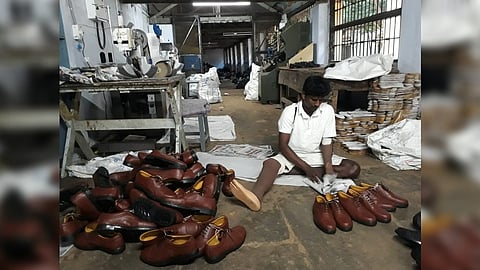

CHENNAI: After nearly two years of lull owing to the COVID-19 pandemic, the century-old weaving units of the prison industry at the Central Prison in Coimbatore are back to normalcy. The units, which were equipped with around 90 mechanised looms, are inching closer to achieving their full production capacity of weaving 700 to 800 metres of khaki clothes for uniformed services. It was one of the top-performing units of the prison industries in the State.
Similarly, the century-old boot-making unit in the Vellore Central Prison for Men and the aluminium and blacksmith units in Central Prison in Salem returned to normalcy in a relief to the working jailbirds. Until the pandemic-induced lockdown hit the State, the prison industries were manufacturing wide-ranging products, from boots for personnel of uniformed services to sanitary napkins and cotton bandages that were supplied to government hospitals across the State.
“The industries were established as part of the reform and rehabilitation measures and to impart life coping skills to enable them for better employability on release,” said an officer.
The industries in 12 central prisons, including three special prisons for women, and Borstal School in Pudukkottai generated a revenue of Rs 79.60 crore in 2019-2020. The industries doubled their revenue of Rs 37 crore in 2016-2017 in three years and had set a target of Rs 100 crore for the coming years.
However, the pandemic slowed down these industries and virtually brought them to a standstill thanks to the non-availability of raw materials. “The revenue declined gradually from Rs 79.60 crore in 2019-2020 to Rs 59 crore the following year. It further declined and recorded a business of Rs 53.32 crore in 2021-2022,” said a senior official of the Prisons department.
Sourcing the raw material was a tough job while maintaining British-era machinery and equipment was another challenge. “We have 65 mechanised looms in the weaving unit, installed here in 1920. We have a challenge in keeping them in working condition. If we stop them from operating for a week or two, they will lose their efficacy. Bringing them back to full production capacity is a difficult job. So, we have been using them on a regular interval with judicial use of the raw material with us during the lockdown period,” said an official attached to Coimbatore Central Prison. He pointed out that the unit is also equipped with three air jet looms and 10 Ruti C looms.
Nearly 200 inmates of the prison work in two shifts in this unit, which can manufacture 1,000 metres of clothes per day. They work in two shifts — 7.30 am to 4.30 pm and 4.30 pm to 2 am with one hour break. “A skilled labour can earn up to Rs 30,000 per month. The wage will be deposited in the prisoner's property account after a deduction of 20 per cent of the wage towards the victim compensation fund and 30 per cent for the upkeep of the prisoner,” said a prison official.
A released prisoner, preferring anonymity, said he saved close to Rs 1 lakh working in the industry in Vellore prison during his incarceration. “My savings helps me feed myself until I find a reliable job with regular income. I am planning to put up a mechanic shop and waiting for financial aid from the prison department’s aid,” said a prisoner who was released a couple of months ago under the government's amnesty programme.
The boot-making unit, which was established in 1830, in Vellore prison was one of the top revenue-generating units in prison industries. The convicts, who have expertise in boot making, manufacture 800 to 100 pairs a day. For decades, this unit has been supplying boots to personnel of the police and Fire and Rescue Services department. Since November 2018, the unit has also produced boots exclusively for women personnel. Hitherto, the women police personnel were using the boots/shoes designed for their male counterparts. “A separate unit was established with a capacity of manufacturing 750 pairs per day,” said the official.
They were among the 16 different kinds of prison department’s cottage industries. They were also into manufacturing bandage cloth, belts, wash well soap and bath soap, woollen blankets, file pads and bakery. As part of the industries, the department has also operated petrol bunks on the outskirts of the prisons to generate more revenue. “We have addressed the issue in procuring the raw materials and floated tenders. Soon, these industries will achieve the optimum production capacity and revenue generation,” he added.
Visit news.dtnext.in to explore our interactive epaper!
Download the DT Next app for more exciting features!
Click here for iOS
Click here for Android